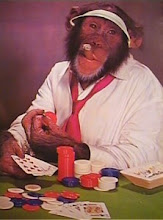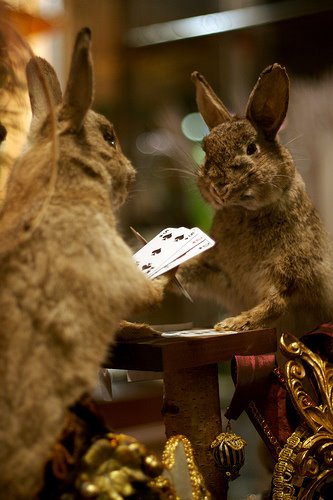The place for actors is on the stage or screen, not in a poker game.
Bad players often reveal the strength or weakness of their hands by trying to project an appearance that they have a strong hand when they actually have a weak hand, or vice versa. Players who try to act or pretend typically think that they are being clever, but they are actually just revealing their inexperience to the better players at the table.
One of the most common examples of acting weak when actually strong is when a player suddenly looks away from the table, to try to look disinterested in the cards just dealt, though he has actually just hit a big hand. Another example is when a player curls his lip into the side of his mouth in order to feign discomfort, worry or disappointment. Likewise, when a player winces his eyes, as if to convey confusion or distaste, typically he is doing this because he wants to pretend that he doesn’t know what he’s doing or that he hates his hand.
One of the most common examples of acting strong when actually weak is when a player stares his opponent down, to try to look intimidating. Another example of feigned strength occurs when a player reaches for chips when his opponent is about to make a bet, to try to make his opponent think that he will call any amount. Likewise, when a player makes a bet or raise by slamming chips down onto the felt with a lot of force, as if to convey that his opponents shouldn’t mess with him because he is confident in his hand, typically he is doing this because he is not actually very confident.
There are thousands of possible facial expressions or other tells that an opponent could show you – intentionally or unintentionally – during a hand. Indeed, there are as many different potential mannerisms as there are muscles in the human face and body, and every distinct muscle movement could mean something different. So whenever you see something new, that you have never before had to interpret, simply ask yourself whether the thing that you saw your opponent do was something that a person ordinarily could control and prevent, i.e. something that is probably not just a subconscious reflex or an uncontrollable tic. If you determine that the mannerism or expression that you saw was something that a person could usually control – and of which a person usually would be aware he is doing – then, most of the time, you can assume that he did it intentionally, in order to try to deceive you by acting strong though actually weak, or acting act weak though actually strong.
But if you determine that a tell that you have just seen in an opponent was not the result of acting, and was merely a subconscious behavior of which he was unaware, you should assume that signs of confidence or comfort indicate a strong hand, while signs of worry or nervousness indicate a weak hand. Very often, movements of the body, arms or hands are reflexive, subconscious movements. Most such body language that you see should be trusted as a reliable, “true” tell.
Examples of subconscious behaviors by weak or bluffing players include squirming around in one’s chair out of nervousness after making a big bet, nervously stacking or fiddling with chips after making a big bet, or leaning forward in one’s chair, as if desperately hoping to draw a much-needed card.
Examples of subconscious behaviors by players with strong hands include leaning back comfortably in one’s chair after betting, sitting up suddenly when a good card is dealt, or looking down at one’s own chips when a good card is dealt, as if thinking “how much can I bet now?” Another sign of a strong hand is when a player’s fingers or hands seem to shake uncontrollably as he places a bet, due to the excitement and anticipation of winning a big pot. Likewise, if your opponent seems to swallow hard, or if the pulse in his neck seems to escalate at the moment when a new card is dealt, he probably caught a big card that helped him. He wouldn’t likely have the same involuntary physical reaction if he saw a card dealt that didn’t help his hand, would he? By contrast, if you see your opponent swallow hard after he has made a big bet, more often than not this is a sign of weakness. The timing of the tell within the hand can provide a lot of information about what the tell means.
But unlike movements of the body or hands, etc., most movements of an opponent’s lips, mouth, cheeks, forehead, or other parts of his face – parts which are usually controlled by him, and which would probably only move, during a poker hand, if he wants them to move – typically occur as a result of acting. Such acting tells should almost never be trusted as genuine, even if they appear to be very subtle or small. Naturally, an actor would try to make his faked expressions seem subtle or small, in order to make you think that they are genuine, real reactions, not pretending. Poker players who act tend to act with their faces (and their words too – which could be the subject of a whole, separate article), but not as often with the rest of the body.
Remember that almost anything your opponent does with his face is done intentionally and for the purpose of deceiving you. Think about it: if a person would normally be aware of a certain muscle in his face and be able to control it, and you see some movement there, it is probably the result of his attempt to fool you – even if he only had a second or less in which to decide to be an actor in a certain situation. Typically, actors at the poker table do their acting within a mere second or two of when a critical event occurs, such as a scare card being dealt or a big bet being made. Indeed, actors are more likely to act within such a short time after a critical event than they are to act after having a bit of time to think about it, because the acting itself is usually an automatic response. That is, actors in poker can’t stop themselves from reacting to a critical event; their instinctive reaction is to try to fool you by pretending that they hate their hand when they really love it, or that they love it when they actually hate it.
Don’t fool yourself into thinking that what you saw an opponent do was a true, subconscious tell, when it was actually acting. When in doubt, assume that any facial expression, small or large, is acting, not subconscious. A tell usually is acting if it is something that a normal person would be able to control and be aware of himself doing. For instance, a normal person can stop himself from curling his lip into the side of his mouth as if to look disappointed or concerned, and a normal person knows when he has revealed such a facial expression. In other words, people can feel their own faces and control all parts of their faces. Only a total beginner who has just learned the rules of poker would allow himself to reveal such a plain and genuine human expression when his opponents obviously can see him (unlike in online poker, of course). So unless your opponent is an absolute novice to live poker (and you would almost never encounter such a person when playing for real money, outside of a home game), you must assume most of the time that a facial tell you see is an acting tell and not a subconscious or true tell.
Of course, regarding your own potential tells, the best way to avoid telegraphing the strength or weakness of your hand to your opponents is to refrain from “acting” at all. Also, don’t overthink the situation and try to trick your opponent through “reverse psychology” or something stupid like that. That is, don’t try to act weak when you are actually weak, or strong when actually strong, in order to confuse an opponent that you know is a good player familiar with tells. If you try to create such a “fake tell,” your attempt at being clever will almost always backfire in your face.
After you have made a large bet and are waiting for your opponent to decide whether to call, raise or fold, rather than trying to “act” at all, it is usually best to simply sit there, looking down at the felt or straight ahead (though not directly at your opponent), breathing normally. When your opponent is staring at you, desperately trying to get a read on how comfortable or confident you feel, just don’t think about the hand that you are holding. Instead, think about football, or sex, or the household chores you have been meaning to do – or, if you are a woman, think about shopping, romance, or the household chores you have been nagging your husband or boyfriend to do. Just think about anything other than the hand that you are now playing or the fact that are bluffing, or semi-bluffing, of not bluffing at all.
When you are waiting for your opponent to decide what to do after you make a big bet, if you simply don’t think about the hand you shouldn’t become nervous or give off any noticeable tells. Allow yourself to become a relaxed, poker playing machine. Imagine that you are a surgeon at the poker table, always with a steady hand as you operate, never allowing emotion to interfere with your careful execution of the task at hand. Enjoy just being relaxed. Detach yourself from the situation, like a neutral observer floating above the table, looking down at the game, not concerned with the outcome.
If you are bluffing, don’t worry about having your bluff called. If he calls, he calls; whatever will be will be, etc. You have already made your bet and can’t take it back. So don’t give into the temptation to try to “act” your way out of the situation. It won’t usually work and will only increase the chances that your opponent will detect the weakness of your hand.
[*Please feel free to post, in the comments below, your own insights about tells or about specific tells to look for in opponents and to avoid exhibiting in your own face, body, etc. The purpose of this website is to allow serious players to share insights, ideas and information, to help each other out – so please post your own thoughts any time in the comments.]
Subscribe to:
Post Comments (Atom)


















4 comments:
nice post. what about eye movements too? these often tell me what people are thinking about.
-Cal D.
Good points. Even many otherwise good players engage in this kind of stuff, unaware of how they are giving away info. to ppl.
I like your blog. These are some good points. I think I am guilty of doing some of the things you say not to do.
Great writing. Hope you post more often.
Post a Comment